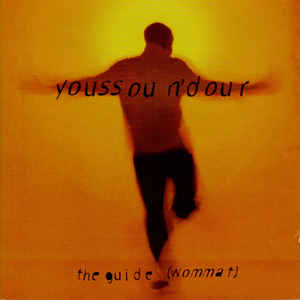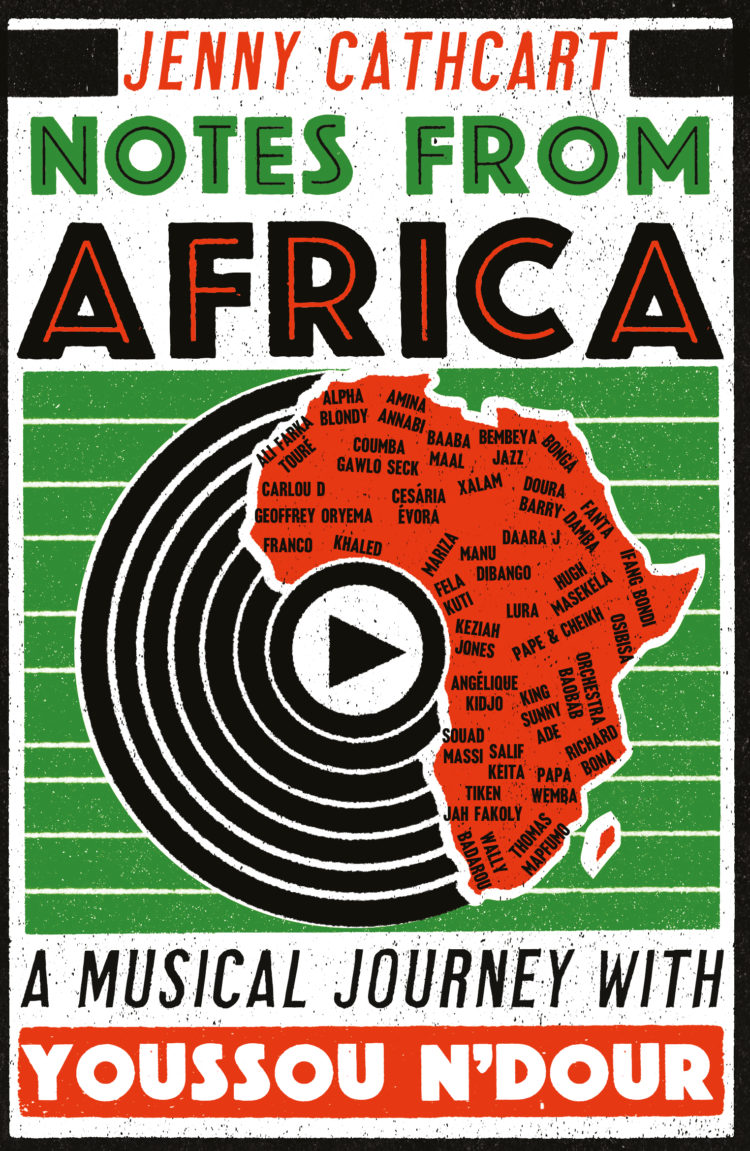A day ahead of our interview with author Jenny Cathcart, we are publishing an excerpt from her book Notes from Africa: A Musical Journey with Youssou N’Dour.
A STAR IS BORN
As he emerged on the local music scene, Youssou N’Dour, Senegal’s first pop idol, was often compared to American superstar Michael Jackson. Indeed, that is how he was described to me when I arrived in Dakar in October 1984. The shy, serious, talented and charis- matic young man I met then was – whether he was aware of it or not – on a mission to drag his own Wolof culture out of the shadow of colonialism and to prove that, with hard work, faith, courage and ambition, it is possible to succeed and give hope to others.
Youssou was born the first child of Elimane N’Dour and his wife, Ndèye Sokhna Mboup, at Rue 31 x 22 in the Medina district of Dakar on 1 October 1959, just six months before Senegal gained independence from its French colonisers. While his father belongs to Senegal’s main ethnic group, the Wolof, Youssou’s Toucouleur mother is a gawlo, a female praise singer. Gawlo is a hereditary title; through his mother he can trace a musical lineage that stretches back seven generations: Yirim Diop, mother of Yaram Diop, mother of Yacine Mar, mother of Mame Ngoné, mother of Marie Sène, mother of Ndèye Sokhna Mboup, mother of Youssou N’Dour.
In general, Senegal’s hereditary musicians, including those who play drums, are known as griots, but those who sing and play the xalam, the West African lute, are defined as gawlos. Youssou was fascinated by the atmosphere in the large griot/gawlo household where he grew up, the home of his maternal grandmother, Marie Sène, one of the most famous singers of her day. Here he watched with fascination all the comings and goings, the ceremonial cos- tumes, the lavish preparations for feast days and festivals. He remembers with pride performances by his maternal grandfather, Boubacar Mboup, and by Samba Diabaré Samb, both well-known virtuosi on the xalam. Youssou owes his singing prowess to his mother’s family, as he told me in the early 1990s:
In Africa, especially in the gawlo families, we sing with the stomach, to give out something from inside. I sing with a great deal of effort. My mother and her gawlo relatives learned to sing like that because it was their tradition.
One day, as he and I watched Van Morrison’s blistering perfor- mance of ‘Caravan’ with Robbie Robertson and The Band in Martin Scorsese’s documentary The Last Waltz (1978), Youssou remarked that, like him, Morrison sings from his stomach.
At the outset of his career, Youssou was all too aware that he came from Medina, the poorer district of Dakar, rather than the wealthy Plateau and that, as members of a casted group, his griot relations were considered inferior to the noble classes. Although Youssou’s father is not a griot, the stigma attached to Youssou’s mother’s lineage has been challenging at times. Although as a young man he was sensitive to any implied criticism, this also spurred him on to work hard and to succeed. At the same time, he learned a great deal from his griot parents, whose knowledge of social mores and whose status as praise singers and guardians of history he respects. Throughout his career he has consulted them to check his Wolof lyrics or his phrasing, and in a conversation with me he acknowledged their contribution to society:
We [the griots], who were once the troubadours, entertainers and chief advisers to the Mandé kings, are guardians of our culture and we have been at great pains to preserve it. We have remained quite traditional until the very last minute before opening out to the world. I am a thoroughly modern griot, but I know that even today music can carry a message and change people’s lives.
When Senegal became independent, its first president, Léopold Sédar Senghor, poet and French academician, insisted upon high levels of education and placed special emphasis on arts subjects and music. His theory of enracinement et ouverture (authenticity and openness), formulated from his own experience as a writer and poet, called for a sound knowledge of Senegalese traditions together with an appreciation of Western cultural values. Youssou’s percussion-based mbalax music, which is influenced by traditional songs and dances whilst integrating Western instruments and song structures, perfectly fulfils this Senghorean principle.
Youssou instinctively feels the pulse of the Senegalese people. He knows that they want to hear pop songs sung in their own language and will follow the sabar drums into the city nightclubs to rival the dazzle of the neon lights with their arm-flailing, high- kicking, spine-tingling dance routines. So he sings in Wolof. He sings for the people: for wealthy patrons, for market traders and the boys and girls of the Medina. He has dared create a popular music that tells old tales and modern truths, a music that makes the saddest people dance to the drums of their ancestors. The invigorating rhythms of the past are fused with the instruments and techniques of today’s global music and together they provide the perfect soundtrack for a landscape of searing heat, Sahelian dust, and the hustle and bustle of one of West Africa’s most sophisticated modern cities.

You can buy Notes From Africa directly in this link.

